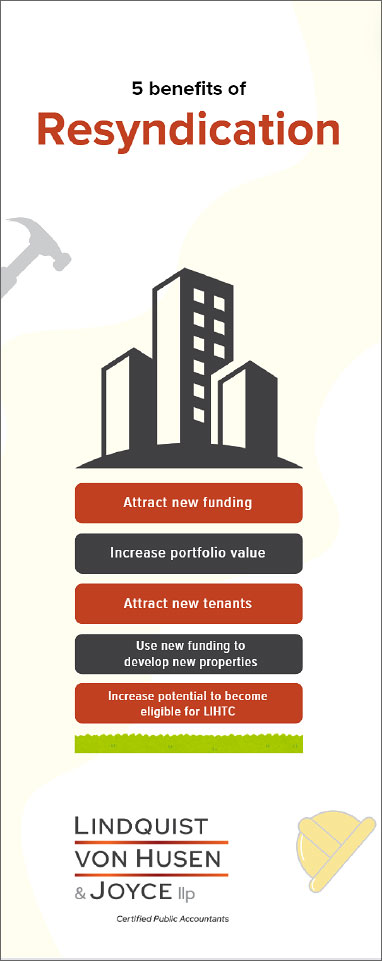
For older multi-family housing properties that need rehabilitation beyond what is possible with replacement reserves, developers will seek outside investors interested in tax credits.
Introducing Resyndication
New private equity players are assembling funds to support these projects and preserve affordable housing, but the project must be large enough to make it worth their investment. Resyndication is one way to expand the scope of the deal, specifically by combining several small properties into one large partnership eligible for low-income housing tax credits (LIHTC).
See our blog on 2024 LIHTC updates for more information!
Conversely, national developers may review their portfolio for large entities that can be broken into smaller resyndicated tax credit deals.
Benefits of Resyndication
 Resyndication is a viable option at year 15, which is the typical length of a tax credit partnership when investors have received all eligible tax credits and possible write-offs and are ready to exit the deal. But some developers also pursue resyndication for non-tax credit properties in their portfolio. They can raise funding for existing properties before finding new properties to develop.
Resyndication is a viable option at year 15, which is the typical length of a tax credit partnership when investors have received all eligible tax credits and possible write-offs and are ready to exit the deal. But some developers also pursue resyndication for non-tax credit properties in their portfolio. They can raise funding for existing properties before finding new properties to develop.
Compared to new construction, resyndication is more complex because it involves old and new funders, transfer of debt and considerations for existing properties and residents.
How Does Resyndication Work?
Resyndication can work more smoothly when developers involve their state financing agency, attorney and CPA early in the process. While it is in the state’s best interest to preserve affordable housing through regular upgrades to older properties, the new partnership must still qualify for resyndication.
- Review the qualified allocation plan (QAP) to determine the extent of new building codes or requirements. Some properties may qualify for preservation status or waivers from these requirements.
- Developers must also involve funding sources, both public and private, because their consent is required for refinancing. Each source of financing has its own terms and compliance requirements.
- Likewise, developers will need approval from current investors to support an exit plan and resyndication, whether or not those investors are involved in the new partnership.
- With all of that in place, a resyndicated property will go through the planning process, approvals and permitting by the city and county before rehabilitation can begin.
Cost Certification Audits for Resyndicated Properties
From an auditor’s point of view, cost certification audits for resyndicated properties are more complex than for new construction. The cost certification will factor in things such as relocation costs for tenants, loan interest depreciation for out-of-service units and lease-up calculations. These factors trickle down to the tax return immediately in a resyndication, with tax credits factored in only after the rehabilitation is complete.
Considering the Options
With the specter of higher taxes for individuals and businesses, affordable housing developers can include resyndication as one viable strategy to attract new funding. Planning will help them sustain attractive properties that increase the value of their portfolio and attract future tenants.
If you have questions about resyndication or cost certification audits for resyndicated properties, contact us at LvHJ.
You may also be interested in a New How-To Guide for Affordable Housing Finance








